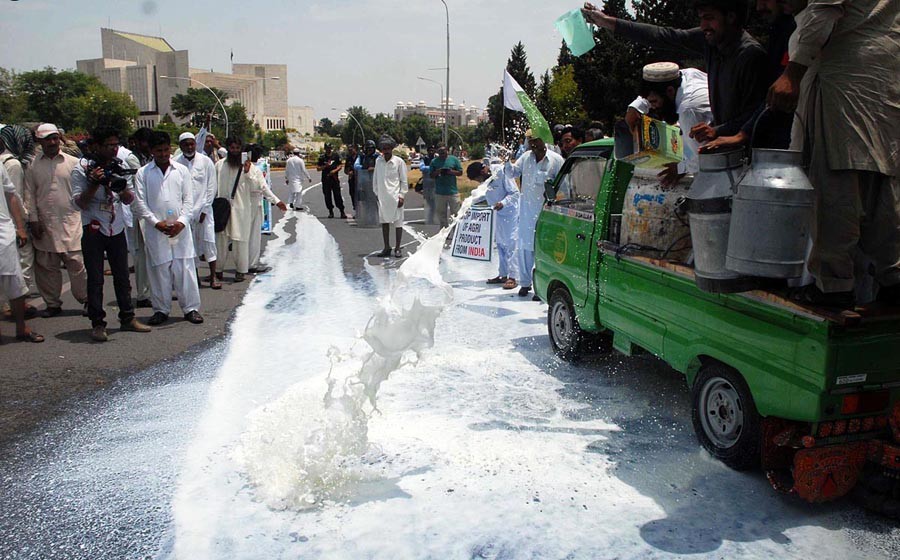
The PM’s agri package has received a mixed response from the stakeholders

The prime minister of Pakistan announced a relief package worth Rs 351 billion for farmers on September 15 at the Kissan Convention in Islamabad. Prior to this announcement, several meetings were held between farmers and the government representatives at different venues, where they weighed options to bail out the reeling agriculture sector.
Apart from these parleys, farmers showed their muscle, turned out in large numbers and blocked highways and busy spots in provincial and federal capitals. They were seen throwing milk outside the parliament house in Islamabad and rolling potatoes near the Punjab Assembly to register their protest.
The major grievance of the farmers was that they had failed to recover the heavy input costs and suffered losses due to declining commodity prices in the local and global markets. There were surplus stocks lying in godowns and farmers were short of money to sow new crops. The farmers wanted the government to announce support price for different crops, including cotton and reduce the cost of agricultural inputs by removing different taxes.
All Pakistan Textile Mills Association (APTMA) opposed the farmers’ demand about support price for cotton vehemently. It feared this government intervention would lead to unjustified escalation in cotton prices, making it impossible for the textile sector to compete with its regional competitors. APTMA’s suggestion was that the government must provide direct subsidy to the farmers if it wanted to facilitate them and refrain from creating a bullish buying sentiment in the market.
As per details, funds under the PM package will be provided through immediate cash grants and subsidies on agricultural inputs worth Rs140 billion. Furthermore, loans worth Rs185 billion will be disbursed from this year onwards. Around Rs20 billion have also been earmarked for cash grants to the tune of Rs5,000 per acre for growers of rice and cotton. This package is directed at small farmers who hold up to 12.5 acres of land, many of whom are involved in subsistence agriculture.
While the package announcement has been celebrated by the PML-N camp, it has drawn criticism from different quarters. For example, Sindh Chief Minister Qaim Ali Shah has claimed that neither he nor his government was consulted before the finalisation of the project. This, he says, was despite the fact that the subsidy on fertiliser has to be awarded on the principle of equal sharing by the federal and provincial governments.
Sindh’s reservations regarding its getting less than its due share of water have not been addressed in the package, he claims.
Similarly, the Pakistan Tehreek-e-Insaf (PTI) Chairman and MNA Imran Khan has termed the package announcement a huge pre-poll rigging attempt by the PML-N prior to the local government elections in Sindh and Punjab. His point is that the PM should have announced relief package for farmers in the federal budget. The package, he says, is not workable because the provincial government in KPK has already disbursed its budget and is not in a position to give money for subsidy on fertiliser. The Election Commission of Pakistan (ECP) has rejected this allegation and given a clean chit to the package saying it is not for a specific area but for the overall agricultural development in the country.
Waseem Qureshi, a landowner based in Lodhran, believes that the package is a realisation on part of the government that the country cannot progress without taking farmers on board. Though it is not all-inclusive it is a good beginning at the least, he adds.
Qureshi says subsidy on fertiliser is a good step and it is hoped that the government will extend it to other inputs including pesticides, seeds, fuel etc. He adds loan facilities for farmers will save them from aarhtis (middlemen) who exploit them to the fullest.
Further, he adds the aarhtis charge farmers huge interest, sell substandard inputs to them and purchase agricultural produce at rates much lower than market price. "Cash grant worth Rs5,000 per acre will be a blessing for small farmers who have suffered heavy losses this year."
Most farmer associations, on the other hand, want the government to announce a support price to guarantee a certain amount of return on their investment. The package itself, however, has not offered any of these.
The Islamabad-based Institute of Policy Reforms (IPR) has analysed the package and recommended support price for additional products in a report. Of these, it says, rice and cotton need early inclusion. "The government may provide export subsidy for rice to help dispose of present stock as well as stabilise the domestic prices. The government may reduce the prices of light diesel oil, as 90 per cent of all tubewells work on diesel."
IPR recommends reduction in the general sales tax on oil from the present 29.5 per cent to seven per cent to facilitate farmers.
Khalid Mahmood Khokhar, President Pakistan Kissan Ittehad (PKI) says farmers want agriculture sector to flourish -- something that is not possible without bringing down the input costs. Cash grants and loans offer liquidity to farmers but do not ensure return on the investments they make. "What if the same situation exists next year?"
He says the cash grants will be offered to farmers owning 12.5 acres or less which means there is nothing for those farmers who have landholdings more than this limit. "Subsidies on inputs, on the other hand, would have benefited farmers across the board."
Khokhar compares some of the input costs incurred by Pakistani and Indian farmers. For example, he says, a urea bag costs Rs450 in India but Rs2050 in Pakistan, DAP fertiliser costs Rs1600 in India and Rs4000 in Pakistan, subsidised green diesel is available in India as compared to that available on commercial rates in Pakistan. In many areas of Punjab electricity is available free of cost. "We love to compete with India. Why can’t our rulers compete with India when it comes to facilitating farmers?"